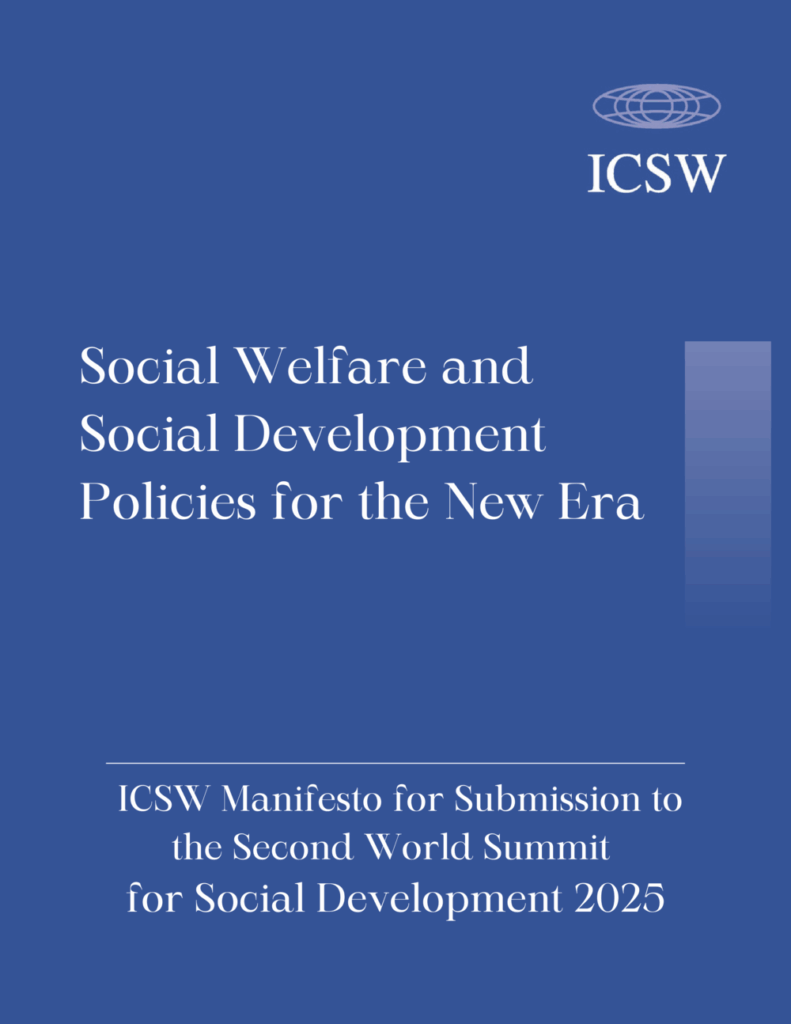
In April 2025, the International Council on Social Welfare (ICSW) published its Manifesto for Submission to the Second World Summit for Social Development 2025, re-affirming their dedication to advancing human dignity, well-being, social justice and inclusive policies worldwide. The Manifesto is available in English, Arabic, French, Spanish, German and Portuguese.
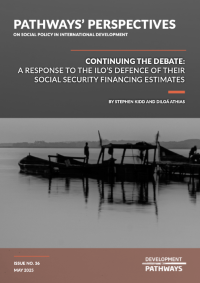
In March, Stephen Kidd, Diloá Athias and Olivia Claxton wrote a critique of the ILO’s estimates of the universal social security financing gaps. The ILO responded, defending their results. You can find their response here.
Stephen and Diloá have provided a further response to the ILO and maintain that the ILO’s estimate of a cost of 19.8 per cent of cumulative GDP to achieve universal social security across low-income countries is too high.

Algorithmic, Wage and Labor Exploitation in
Platform Work in the US
The Human Rights Watch Report, “The Gig Trap: Algorithmic, Wage and Labor Exploitation in Platform Work in the US” published in May 2025 it is focuses on seven major companies operating in the US: Amazon Flex, DoorDash, Favor, Instacart, Lyft, Shipt, and Uber. These companies claim to offer gig workers “flexibility” but often end up paying them less than state or local minimum wages. Six of the seven companies use algorithms with opaque rules to assign jobs and determine wages, meaning that workers do not know how much they will be paid until after completing the job.
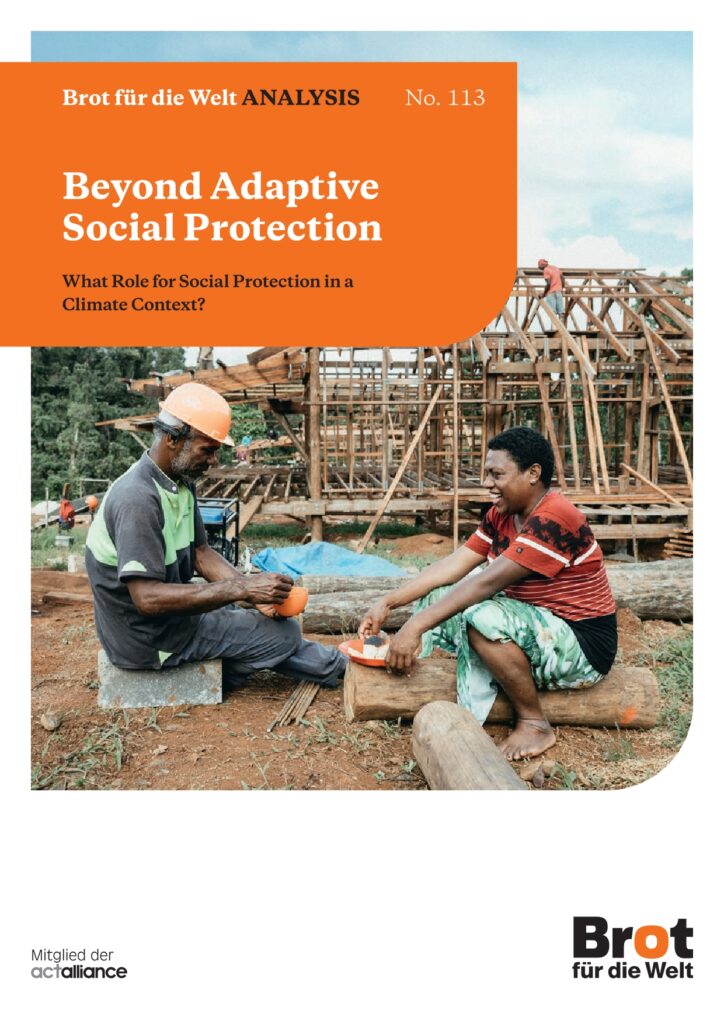
What Role for Social Protection in a Climate Context?
Climate change is significantly altering and exacerbating individual and collective risks and their impacts. These impacts concern everyone across the globe but are particularly felt by the most vulnerable population groups in low-income countries who are disproportionally exposed to climate related risks.
Over the last 10 years the concept of adaptive social protection has gained increasing momentum in the global development discourse.
Analysis No.113 was published by Bread for the World in April 2025.

Only International Justice Can Create Social Security.
With this journal, Bread for the World (BftW) wants to contribute to the debate on policy coherence. The aim is to sensitise political action in the Global North to these challenges. To this end, this publications sheds light on specific topics and raise questions about complex global economic relationships. The answers to these questions will determine how we will live in global solidarity in the future and whether all people will be able to live their lives in social security. The question is: which policies of the Global North, and Germany in particular, impair the expansion of social protection in the Global South? What needs to be changed here in Germany?
Analysis No.110 was published by Bread for the World in April 2025.
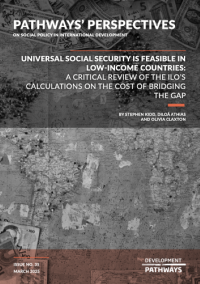
A critical review of the ILO’s calculations on the cost of bridging the gap.
In this new Pathways’ Perspectives piece, Stephen Kidd, Diloá Athias and Olivia Claxton examine the ILO’s claim that universal social security would cost low-income countries 19.8 per cent of GDP. Their research reveals this figure is significantly inflated due to methodological challenges.
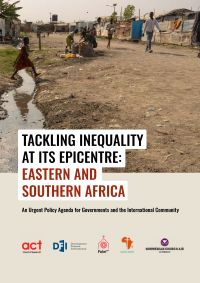
An Urgent Policy Agenda for Governments and the International Community
The Report published in April 2025 by DFI, African Council of Churches, Norwegian Church Aid, ACT Church of Sweden, and Felm, analyses the extreme levels of inequality in Eastern and Southern Africa and defines a policy agenda to cut it dramatically.
Eastern and Southern Africa is a global epicentre of extreme inequality, with two-thirds of its countries having very high income inequality, and even higher wealth inequality. Extreme inequality is increasing poverty and hunger, corroding politics, destroying citizen trust in governments, and sparking political unrest, fuelling division, and slowing growth. The Report finds that most of the governments in Eastern and Southern Africa are rowing backwards on policies to reduce inequality, so it will rise even higher in future.
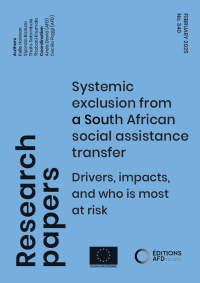
Drivers, impacts and who is most at risk
Understanding the systemic barriers to social assistance
Millions of working-age South Africans qualify for the Social Relief of Distress (SRD) grant, yet less than half receive it. This research by the Institute for Economic Justice (IEJ), with support from Agence Française de Développement (AFD), exposes how flawed poverty targeting and administrative failures lead to widespread SRD grant exclusion, deepening economic hardship for vulnerable groups. March 2025. Watch the webinar - Presentations

Poverty and Gender in Germany’s Social Security System
This Human Rights Watch report published in March 2025 finds that structural gender inequality in Germany’s labor market—combined with inadequate social security—leaves many at risk of poverty, particularly single-parent women led households and older women. One in five children and over two in five single-parent households face poverty or social exclusion. Limited access to full-day childcare and entrenched gender roles push women into low-wage, part-time jobs. Older adults on low fixed pensions, especially women, face rising poverty and are often forced to choose between food, heating, or healthcare. Nearly 40% of women over 65 receive pensions below €1,000/month—well below the poverty threshold—compared to 15% of men.

Global Insights and Pathways Forward.
UNANIMA International's publication which has a broadened scope to explore how homelessness is experienced by a range of marginalized groups, to highlight how homelessness intersects with other global issues like climate change, and to showcase solutions and best practices our partners are implementing at every level.
Members of the GCSPF contributed to the publication launched in February 2025.
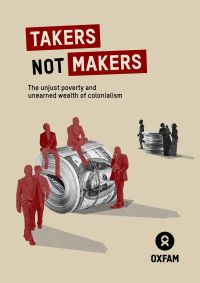
This report, published by Oxfam in January 2025, is focused on inequality and wealth concentration. Billionaire wealth has risen three times faster in 2024 than 2023. Five trillionaires are now expected within a decade. Meanwhile, crises of economy, climate and conflict mean the number of people living in poverty has barely changed since 1990.
This must be reversed. Reparations must be made to those who were brutally enslaved and colonised. Our modern-day colonial economic system must be made radically more equal to end poverty. The cost should be borne by the richest people who benefit the most.
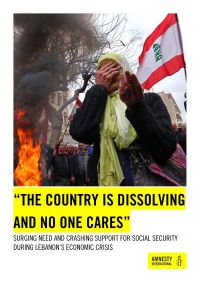
Surging Need and Crashing Support for Social Security During Lebanon’s Economic Crisis
This report, published by Amnesty International in December 2024, examines the impact of the financial and economic crisis on people’s right to social security. Rather than shoring up this crucial right when people desperately needed support, the government let the little support that did exist collapse. The government should work to establish a universal social protection system that becomes capable of supporting people through the different contingencies and risks they will face in the normal course of a lifetime, as well as through the crises that continue to disrupt and devastate their lives.
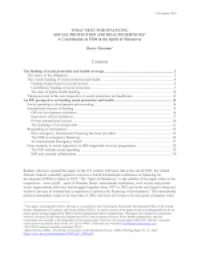
A Contribution to FfD4 in the Spirit of Monterrey
Barry Herman, November 2024
This paper was prepared as part of a project for the United Nations, which is assisting its Member States, international institutions, civil society and private sector stakeholders who are preparing the fourth International Conference on Financing for Development (FfD), which is to take place in Seville, Spain, 30 June - 3 July 2025.
The paper addresses practical and political challenges in designing and adopting adequate financing of social protection and healthcare with domestic revenues and international support in "normal" times and in crisis times. Past FfD conferences have forged agreements on new and reformed international cooperation policies. Additional information may be found here on Conference preparations.
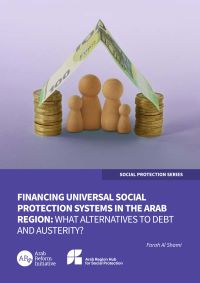
Arab Reform Initiative, Arab Region Hub for Social Protection, October 2024
This paper offers a detailed analysis of the social protection financing landscape, identifying challenges and proposing reforms. Suggested solutions include self-financed contributory schemes, fiscal and public finance reforms, debt relief and restructuring, climate finance instruments, and global funding mechanisms. The paper’s added value lies in politicizing a typically technical discussion and drawing comparative insights from five national contexts: Egypt, Lebanon, Jordan, Tunisia, and Morocco.
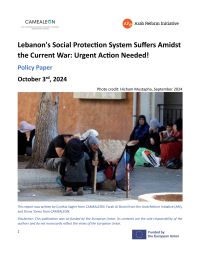
Arab Reform Initiative, CAMEALEON, October 2024
This policy paper provides recommendations for policymakers to further develop this response and later improve the shock-responsiveness and -resilience of the country’s social protection system.
The war in Lebanon has exacerbated the existing economic crisis, leading to mass displacement and increased poverty. The emergency response has been inadequate and limited to cash transfers and in-kind donations reaching only a small portion of those in need.

Arab Reform Initiative, Arab Region Hub for Social Protection, October 2024
The West Asia-North Africa (WANA) region has poor tax collection rates. At first glance, one might attribute this to oil-producing countries known for low tax rates. However, even when excluding these countries, the tax rate in oil-importing countries remains around 18%, which is below both the global average and the averages of comparable countries and regions.
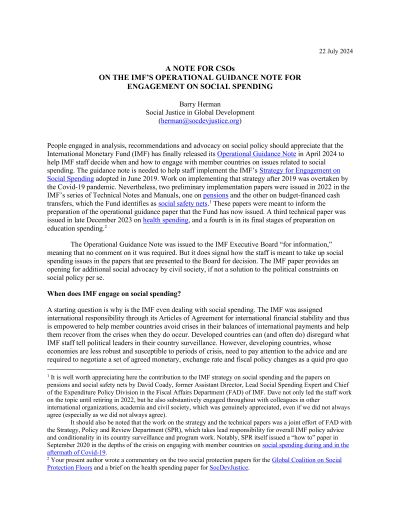
By Barry Herman, Social Justice in Global Development
In April 2024 the IMF released its Operational Guidance to help IMF staff decide when and how to engage with member countries on issues related to social spending. The Operational Guidance Note was issued to the IMF Executive Board “for information,” meaning that no comment on it was required. But it does signal how the staff is meant to take up social spending issues in the papers that are presented to the Board for decision. The IMF paper provides an opening for additional social advocacy by civil society, if not a solution to the political constraints on social policy per se.
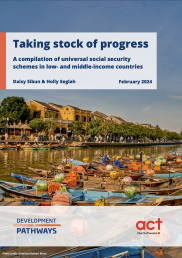
A compilation of universal social security schemes in low- and middle-income countries.
By Daisy Sibun & Holly Seglah. February 2024
In this paper, the authors compile information about existing social security programmes for children, elderly, and persons with disability. We find that universal programmes are not only feasible in theory, but that they do exist. We have identified 88 such social programmes in 52 low- and middle-income countries that are universal or benefit-tested. This compilation does not prove that low- and middle-income countries can afford universal programmes but shows that it should not be assumed that they cannot do so.
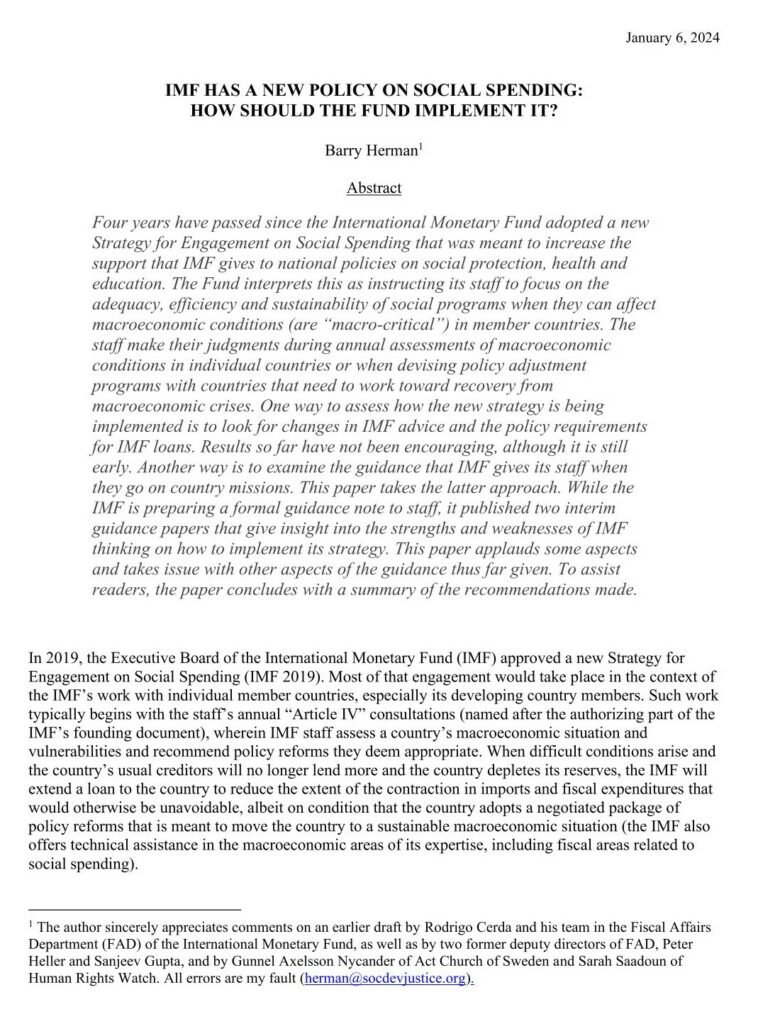
By Barry Herman, Social Justice in Global Development
Four years have passed since the IMF adopted a new Strategy for Engagement on Social Spending that was meant to increase the support that IMF gives to national policies on social protection, health and education. The Fund interprets this as instructing its staff to focus on the adequacy, efficiency and sustainability of social programs when they can affect macroeconomic conditions in member countries.
Results so far have not been encouraging, although it is still early. The IMF has published two interim guidance papers that give insight into the strengths and weaknesses of IMF thinking on how to implement its strategy.

Guide on which vocabulary and arguments to use while advocating for universal social security

With examples from Uganda, Ghana, India and Vietnam, it shows how universal child benefits, pensions and benefits for persons with disability is affordable, if introduced gradually.

A critical analysis of how the World Bank’s tries to reconcile its overall support of “universal social protection” with its continued promotion of poverty targeted programs

Evidence of extremely high exclusion and inclusion errors in poverty targeted social assistance programs

By promoting austerity, shrinking fiscal spaces, imposing the "cascade approach", and shaping development paradigms, IFIs undermine social protection and exacerbate gender inequalities.

Research and Policy Design Challenges.
This paper by the Arab Reform Initiative looks into financing mechanisms for more inclusive, effective, and sustainable social protection systems in the Arab region. It focuses on the role of the IMF in shrinking fiscal spaces, thus limiting public and especially social spending. It demonstrates how the Fund is promoting austerity, imposing conditionalities that hinder alternatives, driving countries into a debt trap, and enforcing detrimental credit risk management. The paper proposes alternatives to this prevalent model, ranging from key fiscal reforms and solidarity financing instruments to utilizing climate finance as an opportunity for funding universal social security.

This paper by the Arab Reform Initiative discusses how conditionaliality might be turned into an opportunity in countries with nefarious political economy and corrupt political regimes, covering the case of Egypt amid current IMF negotiations.

The paper shows how so-called “social registries” – targeting databases – exacerbate targeting errors, are extremely costly and violate the integrity of people.

This paper, by Stephen Kidd, Gunnel Axelsson Nycander, Anh Tran and Madeleine Cretne published on November 2020, consideres another aspect of the debate on targeting and universality: the role that social protection can play in strengthening or weakening social contracts, which depends on the design of the programmes. Throughout the paper, the authors underscore that the design question is not purely a technical issue for social protection experts to solve or discuss. Rather, it should consider both recipients’ and non-recipients’ reactions to different forms of targeting, which are closely linked to issues around surrounding trust, fairness and political choices.

From 1981 to 2014, thirty countries privatized fully or partially their public mandatory pensions; as of 2018, eighteen countries have reversed the privatization.

This is a short synthesis of the book with the same name, documenting the failures of pension privatization and how countries reversed to a public social security system

This book is a compendium of 50 country good practices in building universal social security systems including floors.

This paper presents cost of universal social protection floors in the poorest countries and discusses financing and affordability

This ILO database offers the latest official data to monitor progress towards universal social protection (SDG 1.3)

This handbook shows that financing universal social security is feasible even in the poorest countries.

Legal depository of international human rights instruments and standards on social security

This paper sets out a post-Covid needs and affordability of a universal basic income in South Africa

An initial analysis of how universal basic income could be part of the just transition agenda in South Africa.

A study showing that stepping up public investments can have significant positive impacts on employment and overall economic growth.
Available in EN ES FR

The report found that financing social protection through progressive forms of taxation – such as progressive income tax, corporate tax, and capital tax – generates positive social and economic outcomes, debunking the myth that such forms of taxation are a drag on employment and growth.
Available in EN ES FR

This study shows that there is a strong economic, as well as moral and public health, case for governments to introduce universal social protection.

Because decisions to introduce flat-rate taxes, reform social contributions and/or privatise pensions are not backed by strong evidence of a positive impact on economic growth, and given that these policies disproportionately favour the wealthy within a society, this paper argues that they are largely political and ideological decisions.

The International Monetary Fund has said that it protects spending on education, health and social protection from cuts in its loan programmes through social spending floors.
Analysis of all 17 IMF loan programmes for low- and middle-income countries during the first two years of the pandemic shows that these floors are deeply inadequate, inconsistent, opaque and failing.

Development finance institutions owned by European governments and the World Bank Group are spending hundreds of millions of dollars on expensive for-profit hospitals in the Global South that block patients from getting care, or bankrupt them, with some even imprisoning patients who cannot afford their bills.
Oxfam is calling on rich European governments and the World Bank Group to immediately halt their spending on for-profit private healthcare


Decades of social policy focused on tiny levels of means-tested support have left most countries completely unprepared for the COVID-19 economic crisis. Yet, countries such as South Africa and Bolivia have shown that a universal approach to social protection is affordable, and that it has a profound impact on reducing inequality and protecting those who need it most.

The findings in this briefing paper show that the IMF is systematically encouraging countries to adopt austerity measures once the pandemic subsides, risking a severe spike in already increased inequality levels. A variety of studies have revealed the uneven distribution of the burden of austerity, which is more likely to be shouldered by women, low-income households and vulnerable groups, while the wealth of the richest people increases.

We need to transform our economies to deliver universal health, education and other public services. To make this possible, the richest people and corporations should pay their fair share of tax. This will drive a dramatic reduction in the gap between rich and poor and between women and men.

In this Q&A doc, Development Pathways and HRW explain the human rights obligations and responsibilities of governments and entities that influence social spending, and the importance of universal social security to meeting them. They also explain the basics of universal social security, how it can reduce and prevent poverty and inequality and protect human rights, including in times of crisis, and how governments can overcome impediments to providing it.